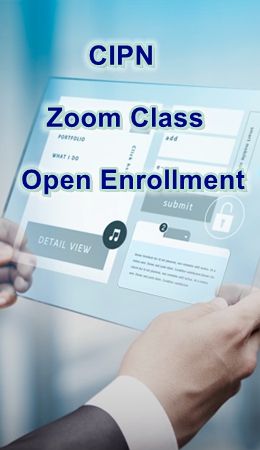FAQs
Q: How Do Online Programs Work?
A: IPSCMI programs are offered totally online on the “Moodle” learning platform. Classes are “asynchronous” and as such do not require real time communication between students and instructor, or from student to student. Students can log on at any time, from anywhere in the world and from any location that is internet enabled.
Communication between students and instructors occurs through email. Students are encouraged to contact other students, also by email, whenever they wish to share their experiences with their online classmates. Students should be prepared to learn from their fellow students as well as their instructor.
Q: What are some of the advantages of online training?
A: Online training is known for its flexibility, but studies have identified several additional benefits of attending class online. Among them:
Communication: Many students are more comfortable engaging in online than in a conventional classroom. These students might have hearing or speech impairments; speak different languages; have severe social anxiety; or simply need more time to organize their thoughts.
Personalized learning: Not all students learn the same way. Online classes providing round-the-clock access to materials and lectures let students study when they feel most focused and engaged.
Accessibility: Online programs transcend time, geographic, and other barriers to training. This can be helpful for those who work full-time or live in remote regions.
Adaptability: Learning management systems support learners with physical, behavioral, and learning challenges.
Efficiency: Studies show online students tend to achieve the same learning results in half the time as classroom-based students.
Q: Is online training as effective as face-to-face instruction?
A: Online training may seem relatively new, but years of research suggests it can be just as effective as traditional coursework, and often more so. According to a U.S. Department of Education analysis of more than 1,000 learning studies, online students tend to outperform classroom-based students across most disciplines and demographics. Another major review published the same year found that online students had the advantage 70 percent of the time, a gap authors projected would only widen as programs and technologies evolve.
While these reports list several plausible reasons students might learn more effectively online—that they have more control over their studies, or more opportunities for reflection—medium is only one of many factors that influence outcomes. Successful online students tend to be organized self-starters who can complete their work without reporting to a traditional classroom. Learning styles and preferences matter, too.
Q: How do I interact with the material on Moodle?
A: It starts when you are given online login instructions and ends four weeks later. You should proceed at your own speed through the curriculum, but should complete the material in a “weekly bucket” by the end of that “bucket’s” week. The examination will be provided to you online immediately after the end of the fourth week and you will receive instructions for submitting it to IPSCMI for grading.
The class is not an online correspondence course. Though you may access Moodle anytime and complete most of the work asynchronously, the course has weekly deadlines and requires regular reading on a disciplined basis. Each student should complete course requirements within the week assigned. If you encounter an unexpected problem not related to coursework, please contact your instructor immediately.
The course is not easier or less time-consuming that conventional course equivalents. In fact, because the content for this course far exceeds what is normally available in a conventional class (we have loaded up a lot of current content), you may want to spend more time than you would in a face-to-face class. It is generally recommended that you set aside 1 hour per day for class time. Likewise, learning online takes much more self-discipline than does learning in a classroom.
Q: Can I download material and read on my computer in lieu of reading online?
A: Most affirmatively!! One of the advantages of asynchronous online learning!!
Q: What equipment and software do I need to do this online course?
A: You must have daily access to a computer with the following minimum requirements for equipment: Pentium PC Computer, 56K modem or better, network connection or a dial-up Internet Service Provider (ISP), Windows 95 or higher or a MIPSCMIntosh Running system 7.5 or higher; minimum of 64MB RAM. As a web browser Microsoft Internet Explorer 5.0 or higher is recommended. I personally use Internet Explorer 6.0 and AOL Gold as browsers and believe those are the most current. I also use Mozilla Firefox upon occasion. I have never used Netscape Navigator, but assume it will work OK. You will need an Adobe Reader, an MS Powerpoint Reader, and an MS Word Program to read the various lectures and materials provided in the course. For your FREE MS Powerpoint Reader, go to https://ccm.net/download/download-51-powerpoint-viewer. For your FREE Adobe Acrobat Reader, go to https://get.adobe.com/reader/ A “WinZip” (evaluation version free at www.winzip.com) is also HIGHLY RECOMMENDED). If you have “connectivity problems”, 9 times out of 10, it will be a problem at your end (firewall oftentimes the problem). If you have problems connecting, we will find some way to get you the material you cannot access. IT IS HIGHLY RECOMMENDED YOU DOWNLOAD MATERIALS FIRST, AND THEN READ THEM ON YOUR COMPUTER RATHER THAN ONLINE!!
Q: What technical computer skills do I need?
A: Online learning platforms are typically designed to be as user-friendly as possible: intuitive controls, clear instructions, and tutorials guide students through new tasks. However, students still need basic computer skills to access and navigate these programs. These skills include: using a keyboard and a mouse; running computer programs; using the Internet; sending and receiving email; using word processing programs; and using forums and other collaborative tools. Students who do not meet a program’s basic technical skills requirements are not without recourse. Microsoft’s online digital literacy curriculum at https://www.microsoft.com/en-us/DigitalLiteracy/curriculum4.aspx is one free resource.
Q: Must I read all the materials posted in the course shell?
A: The answer might be NO if you are very experienced in generic world class practices. The answer might be YES if you are a new entrant in the field and/or lack broad based experience in generic world class practices.
Q: What do you mean by “generic” world class practices?
A: Our materials focus on principles that are non-industry specific and international in context. Try to answer the certification examination questions from the standpoint of what you would do in that context rather than what you might be currently doing in your job.
Q: Can I finish early rather than spend the entire week (or 4 weeks) studying?
A: By all means!! Then you would have more time to “review”.
Q: How is the certification examination structured and how should I approach it?
A: 80 multiple choice questions. Test taking skills focus on the basics of taking multiple-choice examinations.
IF YOU ARE WELL STUDIED you will have the knowledge base to pass the Examination that you have studied. Remember, you do not need to get all questions right. You only have to achieve 60% correct.
The majority of questions in the Examination will be "cake" questions that you will be able to answer IF YOU ARE WELL STUDIED. A typical four item multiple choice question will have one correct answer, one distractor (to catch those not well studied or who misread the question), and two incorrect answers. IF YOU ARE WELL STUDIED you will usually find that your first inclination is your best inclination. Be careful about letting your self doubts talk you out of the correct answer.
Read and Understand the Question thoroughly before you look for an answer. Test writers love to “Rope in the Gullible”.
Focus on the critical or core words in the questions.
Q: Who is eligible to take Certification Preparation Courses?
A: Anyone.
Q: If I chose the online method, will there be any materials received either softcopy or hardcopy?
A: All digital, no hardcopies.
Q: Is the higher lever online course helpful for those people who are NOT certified the lower ones?
A: The higher lever online course covers more management theories. These are helpful disciplines for anyone to study, especially if they are (or hope to be someday) managers.
Q: Is there a Study Guide?
A: Yes, developed one. There is one at the online course site that you can download. The new study guide is VERY THOROUGH and covers the content of the examination. Students who digest the study guide do better on the exam than those who don’t.
Q: Will I be able to send any questions by email if I chose the self study way?
A: The focus is self-study. We do not avoid questions from purchasing professionals whether they are students or not.




